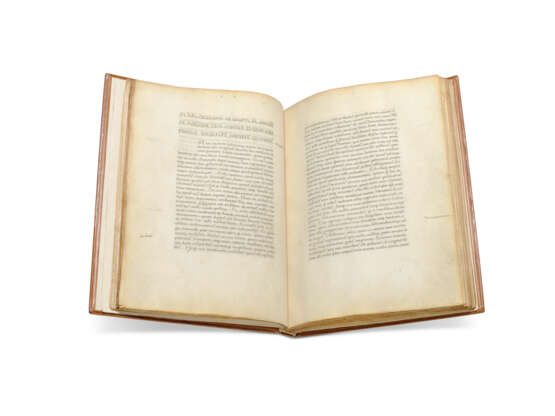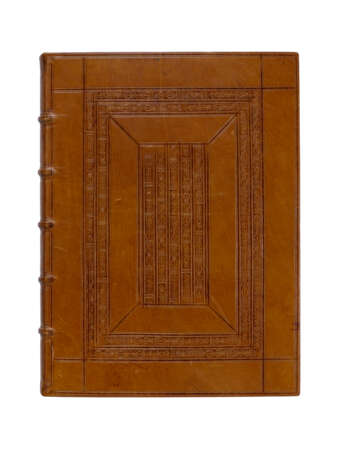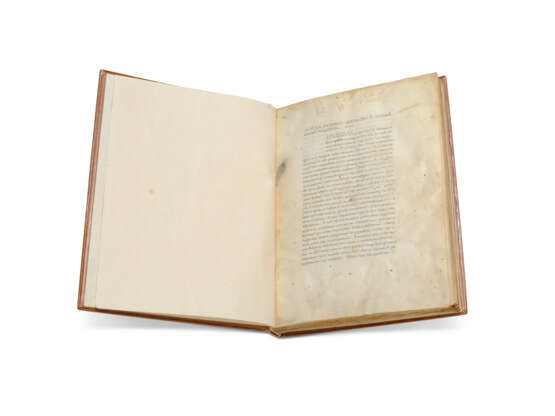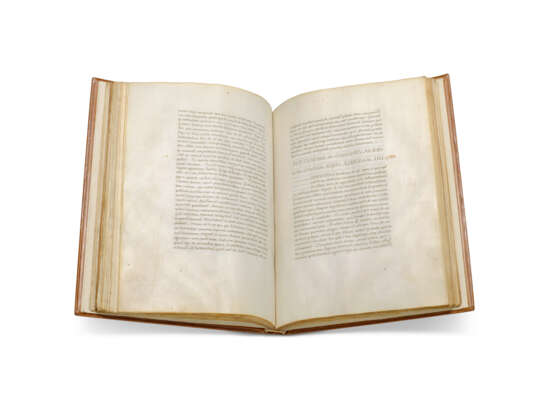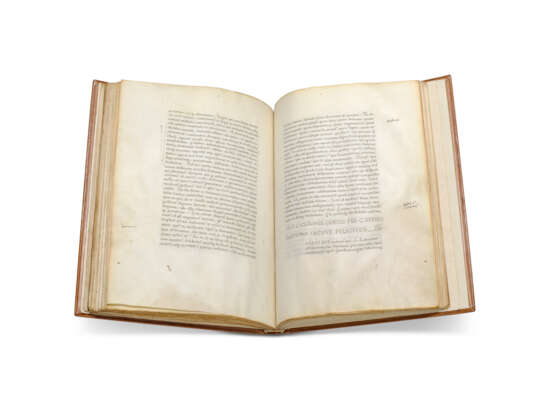ID 1214865
Lot 33 | Cicero's Eight Speeches
Estimate value
£ 30 000 – 50 000
Marcus Tullius Cicero (106–43 BC), Pro caecina etc., in Latin, manuscript on vellum [Italy (Milan), second quarter of the 15th century]
The eight speeches discovered by Poggio Bracciolini in 1417.
275 × 205mm. 86 leaves, complete: collation: 1–810, 96 (of 10, vii–x cancelled blanks), horizontal catchwords, apparently rake-ruled, and written with 31 lines per page in a fine humanistic script: 170 × 110mm, headings in capitals, spaces left for decorated initials, some side notes and glosses, scribbles on the last page include a sketch of a man (a few wormholes in the first and last leaves, some thumbing and smudging, the extreme edges darkened, but generally in reasonably clean condition with wide margins). Sewn on five bands and bound in 20th-century blind-stamped brown leather (a little scuffed).
Provenance:
(1) Inscribed in the late 15th or 16th century ‘Jo. Maria de Pusterla’ (or ‘Pusteria’?) (f.86v), perhaps a member of Lombard family of that name recorded in Milan and Piacenza; the inscription ends with an effaced, cryptic, abbreviation, apparently ‘PP 1713 M’, near which is written ‘PP M.C. 79’, and ‘M.C. 79’.
(2) Inscribed ‘Sebastianus de Bubalis romano’ (f.86v, with his partially erased ownership inscription in the upper margin of f.1).
(3) Internationaal Antiquariaat, Amsterdam, Catalogue 247 (1964), no 68: reported to be the source for the collector whose heirs sold it at Sotheby’s, 21 June 1988, lot 87, bought by:
(4) Maggs Bros., London; Catalogue 1093: Early Printed Books and Manuscripts [1989], no 2, and Catalogue 1103: European Bulletin No. 15 [1989], no 4 (with full-page colour plate); acquired by:
(5) The Schøyen Collection, MS 699.
Content:
A selection of speeches by Cicero: Pro Caecina, ff.1–19; De Lege Agraria (i–iii), ff.19–45; In Pisonem, ff.45v–65; Pro Rabirio Postumo, ff.65–72v; Pro Rabirio Perduellionis, ff.72v–78, breaking off abruptly at ‘[...] si arma iure sumpta concedis inter[fectum]’ with four lines left unwritten, and continuing on the next leaf from ‘Fit S(enatus) C(onsultum) ut Marius […]’; Pro Rosco Comoedo, ff.78v–86v, ending at ‘[...] hoc est Roscio debebat?’, followed by a large space and a note ‘def(icit) residuum’.
This volume contains the eight speeches of Cicero discovered by Poggio Bracciolini (1380–1459) during a series of excursions while he was attending the Council of Constance (1414–18). He found and copied Pro Caecina at Langres, and the other speeches probably in Cologne cathedral, in 1417, as he records in his autograph manuscript (Vatican, Vat. lat. 11458). Martin Davies has ascertained that the text in the present manuscript is derived from Oxford, Bodleian Library, MS D’Orville 78, itself written in the first half of 1418 (see his ‘A note on the history of MS D'Orville 78’, Bodleian Library Record, 11, 1984, 253–58). No complete manuscript of Pro Rabirio Perduellionis or Pro Rosco Comoedo has ever been found, hence their incomplete state in the present copy. Written within Poggio’s lifetime, the present manuscript is a reminder of how much classical literature has been lost, and how much more would have been lost if it were not for the efforts of the small group of early Humanists including Petrarch, Boccaccio, Salutati, and especially Poggio, ‘who found time as papal secretary to indulge in a variety literary pursuits ranging from history and moral essays to polemic and pornography of such accomplished scurrility that it becomes clear that the more robust writings of antiquity had not been rediscovered for nothing’ (Reynolds & Wilson, Scribes and Scholars, 3rd edn., 1991, p.136).
| Place of origin: | Italy, Europe |
|---|---|
| Auction house category: | Medieval & renaissance manuscripts, Books and manuscripts |
| Place of origin: | Italy, Europe |
|---|---|
| Auction house category: | Medieval & renaissance manuscripts, Books and manuscripts |
| Address of auction |
CHRISTIE'S 8 King Street, St. James's SW1Y 6QT London United Kingdom | |
|---|---|---|
| Preview |
| |
| Phone | +44 (0)20 7839 9060 | |
| Buyer Premium | see on Website | |
| Conditions of purchase | Conditions of purchase |
